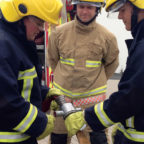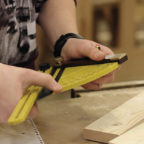 Construction & The Built Environment Higher National Certificate
Construction & The Built Environment Higher National Certificate
Higher National Certificate Construction & The Built Environment (Construction)
The BTEC Higher National Construction and the Built Environment course has been developed in partnership with employers of the construction industry, to produce a nationally recognised qualification to meet the changing needs of the industry. This qualification is for students wishing to develop the knowledge, skills and abilities to undertake a range of professional management-led positions within the industry.
The course has been designed using four different pathways: Construction, Civil Engineering, Surveying and Building Services Engineering. These pathways will enable you to pursue a range of careers within the construction industry such as Architect etc.
This professionally recognised qualification provides the ideal foundation to progress to BTEC HND (Level 5) Construction and the Built Environment or a degree within a construction related area. The Level 5 qualification can also be studied as an apprenticeship option.
The Higher National Certificate is equivalent to the first year of a degree. The qualification is designed for students that have completed the BTEC Level 3 in Construction and the Built Environment or a Level 3 qualification within a construction trade. It is also ideal for someone with industry experience wishing to progress further within their career.
Entry Requirements
Applicants should normally be at least 18 years of age. They need to have completed BTEC Level 3 Construction and the Built Environment or a relevant Level 3 Construction Trade qualification. We will also accept applications from people with significant experience within the industry looking to upskill. In addition, applicants should hold GCSE English and maths grade A* to C or 9-4 or equivalent qualification. Applicants will be invited for interview.
Course Content
To achieve the BTEC HNC in Construction and the Built Environment (Construction) pathway, you are required to complete a minimum of 120 credits. There are 4 units which are considered to be core (mandatory) that equate to 90 credits. The remaining credits are made up of specialist and optional units relevant to the Construction pathway.
The core (mandatory) units for all pathways are: Unit 1 Individual Project, Unit 2 Construction Technology, Unit 3 Science and Materials and Unit 4 Construction Practice and Management.
The specialist units for the Construction pathway is: Unit 5 Legal and Statutory Responsibilities in Construction, Unit 6 Construction Information (Drawing, Detailing, Specification).
How will I be assessed?
The method of assessment varies between units and includes individual and group coursework, presentations, reports, professional practice portfolio etc. Much of the study will require work outside of formal classes, so self-motivation and good time management skills are essential. As a guideline you are advised that a 15-credit unit approximates to a learning time of 150 hours.
Progression
The HNC in Construction and The Built Environment is equivalent to Year 1 of a Degree. Many universities will accept students with HNC to Year 2 of a BA/BSc Honours Degree, depending on the match of the units to the degree programme in question.
UCAS course search https://digital.ucas.com/search will enable you to explore options for courses available throughout the UK.
Fees
The course fees for all students will be £3250 per annum for 2023/24. Details of the student finance available for all higher education students can be found on the student finance website www.gov.uk/student-finance.
Note this course is classed as part-time HIGHER EDUCATION.
This course is available to study as part of an Apprenticeship. You will need to have an employer within the Construction field and course costs can be covered from their Apprenticeship Levy.
Additional Course Costs
For the course you will need a scientific calculator, stationary and some drawing equipment. You may be required to purchase the relevant course text book. Steel toe capped boots may be required for visits, which can range from £25 to £100, but you will be advised during the course if these will be needed.
*Note – All costs may be subject to change and may vary dependent on place of purchase
































